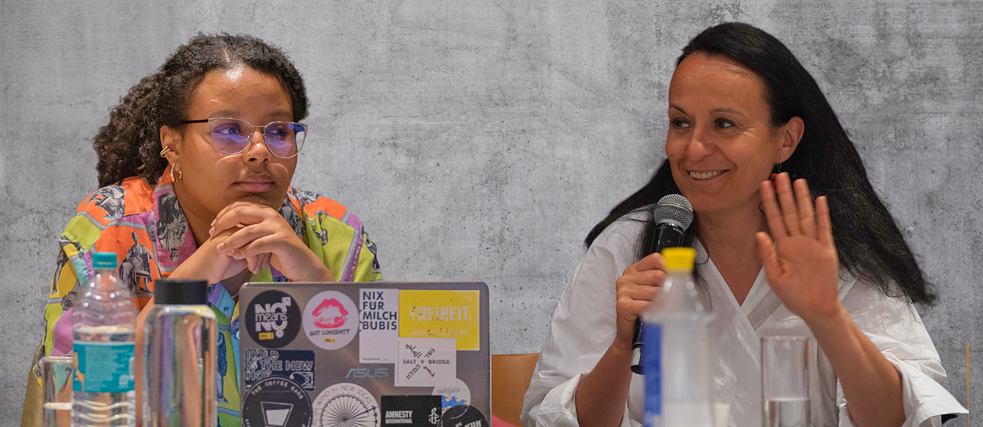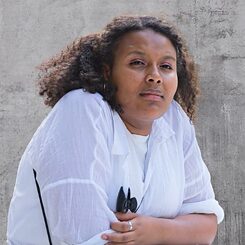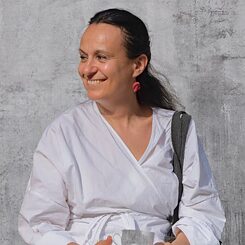A Dialogue on Museum Transformations
Interview with Vera Marušić and Tensae Desta

From reshaping the museum experience for the younger generation to envisioning an ideal, decolonized future, our discussion with Vera and Tensae delves into new curatorial approaches and the integration of gaming to make museums more dynamic and relevant.
What led you to work at museums and engage with cultural memory?
Vera: My childhood experience with museums was rather uninviting; I found them boring. However, upon entering the cultural field, I realized the potential to reshape museums, making them more open and relevant, especially for the younger generation. I take pride in contributing to this transformation, acting as a bridge to connect people with the world of museums.
Tensae: The driving force behind my involvement with museums is rooted in curiosity, particularly in the realms of decolonization and post-colonial theory. I have a keen interest in understanding one by understanding the other. My exploration revolves around moments of cultural collision, untouched by the white gaze, presenting a unique perspective.
In the context of globalization, migration, and new technologies, what is the role of a physical museum and why are they still relevant today?
Vera: Museums, such as the one in Cologne where I work, are committed to connecting historical artefacts with contemporary life. The collections, originating from the colonial era, unfold stories of globalization, encapsulating micro-stories that resonate with the daily lives of our visitors.
Tensae: Museums, in my view, should serve as educational institutions, fostering critical thinking and providing a platform for engaging with new forms of understanding. However, I emphasize the urgency for museums to be decolonized to stay relevant in the future, advocating for equal power dynamics and encouraging cultural exchange.
Given the ongoing polemics around returning or repatriating cultural objects from contexts of colonial injustice, is there an ideal museum of the future?
Vera: The vision of an ideal museum involves active engagement with diverse communities. Rather than engaging in polemics, it should be a space that encourages open discussions about shared histories and memories, fostering an environment of understanding and healing.
Tensae: My assertion that ethnological museums, as they exist presently, should not continue stems from the belief that museums should evolve into mediums of cultural exchange. This transformation would involve breaking away from hierarchical structures and promoting cultural exchange where we can talk about our shared histories, shared memories, and shared pasts.
What are some of the new alternative curatorial approaches you have been leading within your work?
Vera: In Cologne, we are pioneering new collaborative curatorial formats. Rather than having a single curator leading an exhibition, we seek out diverse partnerships. Social centres, historians, and young people who have never experienced our museum are invited to have their own space. Through these partnerships, we want to move beyond tokenism and challenge the conventional model of a glass-box exhibition.
Tensae: My journey in curatorial approaches began by centring on specific audiences, including the trans, queer, black, indigenous, and persons of colour. However, as I spent more time in museums, I began to critically examine the concept of curating itself. Taking a step back, I delved into questions about identity, the nature of museums, the origin of artefacts, and the possibilities that lie ahead.
Reverse forward seeks to address the topic of decolonialism via the idea of ‘play’, specifically via gaming. Is this something you can see being practically implemented in your work and engaging younger visitors to the museum?
Vera: Gaming is an integral part of the reality of young people. While our museum professionals may not be game designers, we recognize the significance of adapting to new and engaging formats. Discussions about gaming ethics have been particularly enlightening during Reverse Forward workshops. Even though the specific game may not materialize within the museum, the exploration of why play is important and how it can be integrated into our museum experience is an ongoing endeavour.
About the Interviewees
Tensae DestaTensae has a Bachelor's in international relations: Politics and History with a minor in Psychology and is currently completing a Master's in North American studies at the University of Cologne, Germany. Tensae started working as a junior curator at the Rautenstrauch-Joest-Museum in December 2022 and has since curated events that centre community knowledge production and foster intercultural and cross-racial dialogues. As a curator and an academic Tensae is committed to intersectional Black feminist modes of storytelling and togetherness with a research interest in post-colonial studies and Afro-Asian shared histories.
Vera Marušić
Vera Marušić is Consultant to the Director and in charge of Program and Strategy Planning at the Rautenstrauch-Joest-Museum – Cultures of the World located in Cologne, Germany since November 2019. After graduating in law, she has worked in various functions as a research assistant, project coordinator and curator in complex, international and interdisciplinary projects in the cultural/arts field and higher education: Hessisches Staatstheater Wiesbaden, HELLERAU - European Center for Contemporary Arts Dresden, Stiftung Deutsches Hygiene-Museum Dresden, Dresden University of Fine Arts and Dresden State Art Collections.

